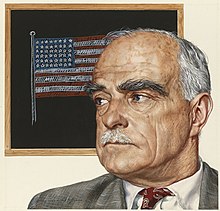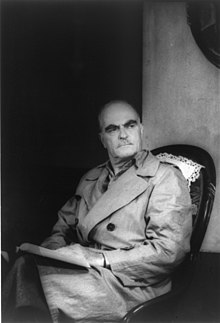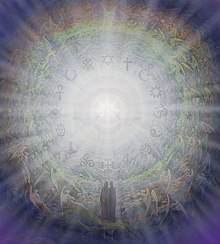Thornton Wilder
Jump to navigation
Jump to search

Thornton Niven Wilder (17 April 1897 – 7 December 1975) was a Pulitzer prize winning American author and playwright.
Quotes[edit]



- We can only be said to be alive in those moments when our hearts are conscious of our treasures.
- The Woman of Andros (1930), based on Terence's Andria
- I hold that we cannot be said to be aware of our minds save under responsibility.
- Literature is the orchestration of platitudes.
- TIME magazine (12 January 1953)
- I would love to be the poet laureate of Coney Island.
- New York Journal-American (11 November 1955)
- Many plays — certainly mine — are like blank checks. The actors and directors put their own signatures on them.
- The New York Mirror (13 July 1956)
- Many who have spent a lifetime in it can tell us less of love than the child that lost a dog yesterday.
- As quoted in "The Notation of the Heart" by Edmund Fuller, in The American Scholar Reader (1960) edited by Hiram Hayden and Betsy Saunders
- Love, though it expends itself in generosity and thoughtfulness, though it gives birth to visions and to great poetry, remains among the sharpest expressions of self-interest. Not until it has passed through a long servitude, through its own self-hatred, through mockery, through great doubts, can it take its place among the loyalties.
- As quoted in "The Notation of the Heart" by Edmund Fuller, in The American Scholar Reader (1960) edited by Hiram Hayden and Betsy Saunders
- I am not interested in the ephemeral — such subjects as the adulteries of dentists. I am interested in those things that repeat and repeat and repeat in the lives of the millions.
- The New York Times (6 November 1961)
- The most valuable thing I inherited was a temperament that does not revolt against Necessity and that is constantly renewed in Hope.
- quoted in "About the Author" following The Bridge of San Luis Rey (Washington Square Press edition, 29th printing, 1963)
The Bridge of San Luis Rey (1927)[edit]
- Like all the rich he could not bring himself to believe that the poor (look at their houses, look at their clothes!) could really suffer. Like all the cultivated he believed that only the widely read could be said to know that they were unhappy.
- Soon we shall die and all memory of those five will have left earth, and we ourselves shall be loved for a while and forgotten. But the love will have been enough; all those impulses of love return to the love that made them. Even memory is not necessary for love. There is a land of the living and a land of the dead and the bridge is love, the only survival, the only meaning.
- Style is but the faintly contemptible vessel in which the bitter liquid is recommended to the world.
- Now he discovered that secret from which one never quite recovers, that even in the most perfect love one person loves less profoundly than the other.
Our Town (1938)[edit]


- People are meant to go through life two by two. 'Tain't natural to be lonesome.
- "Mrs. Gibbs"
- A man looks pretty small at a wedding, George. All those good women standing shoulder to shoulder, making sure that the knot's tied in a mighty public way.
- "Mr. Webb"
- That's what it was to be alive. To move about in a cloud of ignorance; to go up and down trampling on the feelings of those... of those about you. To spend and waste time as though you had a million years. To be always at the mercy of one self-centered passion, or another. Now you know — that's the happy existence you wanted to go back to. Ignorance and blindness.
- "Simon Stimson"
- I can't. I can't go on. It goes so fast. We don't have time to look at one another. I didn't realize. So all that was going on and we never noticed. Take me back — up the hill — to my grave. But first: Wait! One more look. Good-by, Good-by, world. Good-by Grover's Corners...Mama and Papa. Good-by to clocks ticking...and Mama's sunflowers. And food and coffee. And new ironed dresses and hot baths...and sleeping and waking up. Oh, earth, you're too wonderful for anybody to realize you. ...Do human beings ever realize life while they live it? — Every, every minute? ...I'm ready to go back...I should have listened to you. That's all human beings are! Just blind people.
- "Emily Webb"
The Skin of Our Teeth (1942)[edit]

- My advice to you is not to inquire why or whither, but just enjoy your ice cream while it's on your plate — that's my philosophy.
- Sabina, Act One
- I hate this play and every word in it.
- Sabina
- I've never forgotten for long at a time that living is struggle. I know that every good and excellent thing in the world stands moment by moment on the razor-edge of danger and must be fought for — whether it's a field, or a home, or a country.
- Antrobus, Act 3
The Matchmaker (1954)[edit]

- Later adapted into the musical Hello, Dolly
- Marriage is a bribe to make a housekeeper think she's a householder.
- Vandergelder, in Act 1
- Never support two weaknesses at the same time. It's your combination sinners — your lecherous liars and your miserly drunkards — who dishonor the vices and bring them into bad repute.
- Malachi, in Act 3
- Nurse one vice in your bosom. Give it the attention it deserves and let your virtues spring up modestly around it. Then you'll have the miser who's no liar; and the drunkard who's the benefactor of the whole city.
- Malachi, in Act 3
- The test of an adventure is that when you're in the middle of it, you say to yourself, "Oh, now I've got myself into an awful mess; I wish I were sitting quietly at home." And the sign that something's wrong with you is when you sit quietly at home wishing you were out having lots of adventure.
- Barnaby, in Act 4
- Money is like manure; it's not worth a thing unless it's spread around encouraging young things to grow.
- Dolly Levi, in Act 4
- The difference between a little money and no money at all is enormous...and the difference between a little money and an enormous amount of money is very slight.
- Ninety-nine per cent of the people in the world are fools and the rest of us are in great danger of contagion.
Writers at Work interview (1958)[edit]

- Interview for Writers at Work, First series, edited by Malcolm Cowley
- The future author is one who discovers that language, the exploration and manipulation of the resources of language, will serve him in winning through to his way.
- I think myself as a fabulist, not a critic. I realize that every writer is necessarily a critic — that is, each sentence is a skeleton accompanied by enormous activity of rejection; and each selection is governed by general principles concerning truth, force, beauty, and so on. But, as I have just suggested, I believe that the practice of writing consists in more and more relegating all that schematic operation to the subconscious. The critic that is in every fabulist is like the iceberg — nine-tenths of him is underwater.
- The comic spirit is given to us in order that we may analyze, weigh, and clarify things in us which nettle us, or which we are outgrowing, or trying to reshape.
- Winning children (who appear so guileless) are children who have discovered how effective charm and modesty and a delicately calculated spontaneity are in winning what they want.
- On the stage it is always now; the personages are standing on that razor edge, between the past and the future, which is the essential character of conscious being; the words are rising to their lips in immediate spontaneity … The theater is supremely fitted to say: "Behold! These things are."
- Many great writers have been extraordinarily awkward in daily exchange, but the greatest give the impression that their style was nursed by the closest attention to colloquial speech.
- A dramatist is one who believes that the pure event, an action involving human beings, is more arresting than any comment that can be made upon it.
- The theatre is supremely fitted to say: "Behold! These things are." Yet most dramatists employ it to say: "This moral truth can be learned from beholding this action."
- I am convinced that, except in a few extraordinary cases, one form or another of an unhappy childhood is essential to the formation of exceptional gifts.
- One of the dangers of the American artist is that he finds himself almost exclusively thrown in with persons more or less in the arts. He lives among them, eats among them, quarrels with them, marries them.
The Eighth Day (1967)[edit]

- It is only in appearance that time is a river. It is rather a vast landscape and it is the eye of the beholder that moves.
- Those who are silent, self-effacing and attentive become the recipients of confidences.
- Hope, like faith, is nothing if it is not courageous; it is nothing if it is not ridiculous.
- A sense of humor judges one's actions and the actions of others from a wider reference and a longer view and finds them incongruous. It dampens enthusiasm; it mocks hope; it pardons shortcomings; it consoles failure. It recommends moderation.
- We do not choose the day of our birth nor may we choose the day of our death, yet choice is the sovereign faculty of the mind.
- Man is not an end but a beginning. We are at the beginning of the second week. We are children of the eighth day.
- The planting of trees is the least self-centered of all that we do. It is a purer act of faith than the procreation of children.
- When God loves a creature he wants the creature to know the highest happiness and the deepest misery … He wants him to know all that being alive can bring. That is his best gift…. There is no happiness save in understanding the whole.
Theophilus North (1973)[edit]
- Imagination draws on memory. Memory and imagination combined can stage a Servants' Ball or even write a book, if that's what they want to do.
Quotes About[edit]
- My idea of a dream man was Thornton Wilder
- (What’s the best book you’ve ever received as a gift?) When I was in college I witnessed a tragic death, and my father sent me Thornton Wilder’s “The Bridge of San Luis Rey” — a book about a Franciscan friar in Peru who sees a rope bridge collapse, killing five people, and then tries to learn about their lives. Wilder was so great at making sense of life and death, and that book healed me. It’s a shame that we only tend to remember Wilder for the most sentimental parts of his most sentimental play.
- Rebecca Makkai Interview (2023)
External links[edit]
- Brief bio at Kirjasto (Pegasos)
- The Thornton Wilder Society
- Thornton Wilder at the Internet Movie Database
